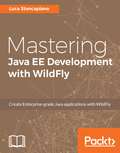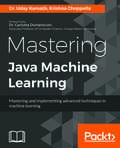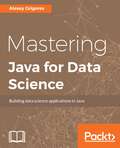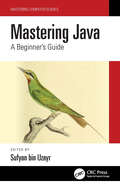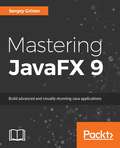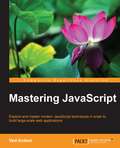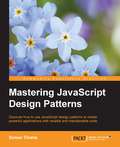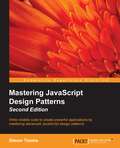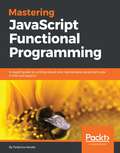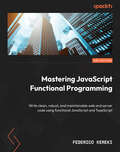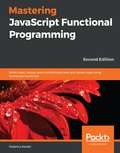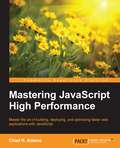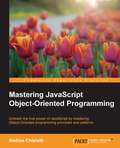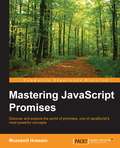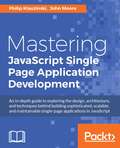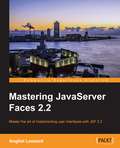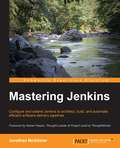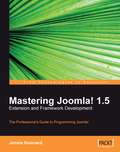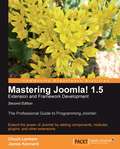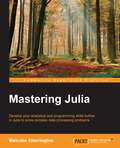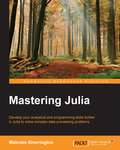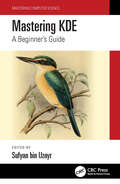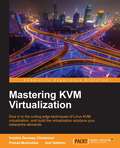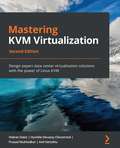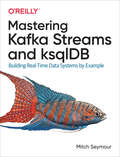- Table View
- List View
Mastering Java EE Development with WildFly
by Luca StancapianoYour one stop solution to create highly scalable enterprise grade Java applications with WildFly. About This Book • Master Java EE development with the latest WildFly 10 application server. • Integrate with JSF and JMS and use efficient load balancing techniques to create real-time apps • Integrate your backend JavaScript code seamlessly into Java applications Who This Book Is For If you are a Java developer with at least basic knowledge of Java EE, then this book is for you. No previous knowledge of WildFly is required. What You Will Learn • Configure the development environment along with native and cloud installation of WildFly • Write a DB schema and the relative entities and how to use the relationships between the entities • Analyze with examples all the java annotations to manage the EJB and the configuration to get better performances • Write different REST services through the EJB • Implement Web sockets 1.0 and know why and when use the web sockets • Work with Active MQ and write JMS clients to manage the authentication and authorization in the clients • Configure the mail server through the wildfly console • Learn how and when to use a new feature JAX-RS 2.0, which is the asynchronous call through REST • Use the new JSF features of Wildfly 10 such as Mojarra 2.2, JSF 2.2, Richfaces 4.5 In Detail Packed with rich assets and APIs, Wildfly 10 allows you to create state-of-the-art Java applications. This book will help you take your understanding of Java EE to the next level by creating distributed Java applications using Wildfly. The book begins by showing how to get started with a native installation of WildFly and it ends with a cloud installation. After setting up the development environment, you will implement and work with different WildFly features, such as implementing JavaServer Pages. You will also learn how you can use clustering so that your apps can handle a high volume of data traffic. You will also work with enterprise JavaBeans, solve issues related to failover, and implement Java Message Service integration. Moving ahead, you will be working with Java Naming and Directory Interface, Java Transaction API, and use ActiveMQ for message relay and message querying. This book will also show you how you can use your existing backend JavaScript code in your application. By the end of the book, you'll have gained the knowledge to implement the latest Wildfly features in your Java applications. Style and approach Each part of this book shows you how to use different features of WildFly 10 to create enterprise grade Java applications as easily as possible.
Mastering Java Machine Learning
by Dr Uday Kamath Krishna ChoppellaBecome an advanced practitioner with this progressive set of master classes on application-oriented machine learning About This Book • Comprehensive coverage of key topics in machine learning with an emphasis on both the theoretical and practical aspects • More than 15 open source Java tools in a wide range of techniques, with code and practical usage. • More than 10 real-world case studies in machine learning highlighting techniques ranging from data ingestion up to analyzing the results of experiments, all preparing the user for the practical, real-world use of tools and data analysis. Who This Book Is For This book will appeal to anyone with a serious interest in topics in Data Science or those already working in related areas: ideally, intermediate-level data analysts and data scientists with experience in Java. Preferably, you will have experience with the fundamentals of machine learning and now have a desire to explore the area further, are up to grappling with the mathematical complexities of its algorithms, and you wish to learn the complete ins and outs of practical machine learning. What You Will Learn • Master key Java machine learning libraries, and what kind of problem each can solve, with theory and practical guidance. • Explore powerful techniques in each major category of machine learning such as classification, clustering, anomaly detection, graph modeling, and text mining. • Apply machine learning to real-world data with methodologies, processes, applications, and analysis. • Techniques and experiments developed around the latest specializations in machine learning, such as deep learning, stream data mining, and active and semi-supervised learning. • Build high-performing, real-time, adaptive predictive models for batch- and stream-based big data learning using the latest tools and methodologies. • Get a deeper understanding of technologies leading towards a more powerful AI applicable in various domains such as Security, Financial Crime, Internet of Things, social networking, and so on. In Detail Java is one of the main languages used by practicing data scientists; much of the Hadoop ecosystem is Java-based, and it is certainly the language that most production systems in Data Science are written in. If you know Java, Mastering Machine Learning with Java is your next step on the path to becoming an advanced practitioner in Data Science. This book aims to introduce you to an array of advanced techniques in machine learning, including classification, clustering, anomaly detection, stream learning, active learning, semi-supervised learning, probabilistic graph modeling, text mining, deep learning, and big data batch and stream machine learning. Accompanying each chapter are illustrative examples and real-world case studies that show how to apply the newly learned techniques using sound methodologies and the best Java-based tools available today. On completing this book, you will have an understanding of the tools and techniques for building powerful machine learning models to solve data science problems in just about any domain. Style and approach A practical guide to help you explore machine learning—and an array of Java-based tools and frameworks—with the help of practical examples and real-world use cases.
Mastering Java for Data Science
by Alexey GrigorevThis book is for those Java developers who are comfortable with developing applications in Java and are familiar with the basic concepts of data science. This is the go-to book for anyone looking to master the subject using Java. If you are willing to build efficient data applications in your enterprise environment without changing your existing stack, this book is for you!
Mastering Java: A Beginner's Guide (Mastering Computer Science)
by Sufyan Bin UzayrMastering Java: A Beginner's Guide introduces developers of all ages to the beautiful and valuable world of Java. Java is frequently used as the default platform for scientific applications, including natural language processing. The primary reason for this is that it is secure, portable, and extensible. It also has excellent high-level concurrency tools. In terms of software development, the introduction of Java undoubtedly was a watershed moment. You’ve surely heard of Java if you’re a software developer. For a multitude of reasons, its relevance and functionality in the world of coding deserve high acclaim. Computers have become highly adaptable devices that can handle multi-level undo and multi-threaded apps, mostly thanks to Java. As its syntax is comparable to English, Java is relatively simple to learn and understand in a short period of time. Despite being a slightly older piece of technology, Java still performs well. It is regularly ranked among the most popular languages of programming. It is critical for enterprise-level web apps and microservices, which are expected to grow in popularity over the coming year. Java will continue to dominate the banking industry and the Fintech business for years to come. Mastering Java addresses various aspects pertaining to Java development. Mastering Java will prove to be of enormous assistance to Java developers of all levels. This book focuses on a variety of topics; it provides a concise explanation of Java's introduction, benefits, characteristics, and examines why Java is so essential. Mastering Java also includes installation advice and information on the many components that make Java work, such as Object-Oriented Programming, Strings, Collections, Packages, and Databases. Mastering Java will always be a helpful resource for both intermediate learners and skilled personnel. Learn more about our other Mastering titles at: https://www.routledge.com/Mastering-Computer-Science/book-series/MCS
Mastering JavaFX 10: Build advanced and visually stunning Java applications
by Sergey GrinevDesign modern, rich interfaces for Java apps using JavaFX 10Key FeaturesLeverage advanced GUI programming techniques using the latest JavaFX 10 framework.Create dynamic content using the animation API and work with different application layersCreate and customize plugins and use them efficiently in different applicationsBook Description: JavaFX 10 is used to create media-rich client applications. This book takes you on a journey to use JavaFX 10 to build applications that display information in a high-performance, modern user interface featuring audio, video, graphics, and animation.Mastering JavaFX 10 begins by introducing you to the JavaFX API. You will understand the steps involved in setting up your development environment and build the necessary dependencies. This is followed by exploring how to work with the assets, modules, and APIs of JavaFX. This book is filled with practical examples to guide you through the major features of JavaFX 10. In addition to this, you will acquire a practical understanding of JavaFX custom animations, merging different application layers smoothly, and creating a user-friendly GUI with ease. By the end of the book, you will be able to create a complete, feature-rich Java graphical application using JavaFX.What you will learnConstruct and customize JavaFX windowsManage UI elements and arrange them on the SceneExplore the Bindings API and use it to coordinate various UI elementsUse FXML to design amazing FX applicationsWrite and manage CSS to style your applicationsAdd audio and video to your projectsPrepare your application to be launched on the target platformWho this book is forIf you’re a Java developer who wants to upgrade to the latest version of JavaFX to create stunning, feature-rich graphical applications, this book is for you. Some basic knowledge of Java programming is necessary to get the most out of this book. prior JavaFX knowledge will help but is not mandatory.
Mastering JavaScript
by Ved AntaniExplore and master modern JavaScript techniques in order to build large-scale web applications About This Book * Write powerful code with the high-level functions that JavaScript offers * Test and debug issues with JavaScript code using various modern mechanisms * Offers an expert's eye on the latest ES6 features and how these advanced tasks fit together in JavaScript as a whole Who This Book Is For This book is ideal for web developers who are looking to master modern JavaScript concepts and design principles. You should already have an intermediate level of JavaScript knowledge before starting this book. What You Will Learn * Get a run through of the basic JavaScript language constructs * Get familiar with the Functions and Closures of JavaScript * Explore Regular Expressions in JavaScript * Code using the powerful object-oriented feature in JavaScript * Test and debug your code using JavaScript strategies * Master DOM manipulation, cross-browser strategies, and ES6 * Understand the basic concurrency constructs in Javascript and best performance strategies * Learn to build scalable server application in JavaScript using Node.js In Detail JavaScript is a high-level, dynamic, untyped, lightweight, and interpreted programming language. Along with HTML and CSS, it is one of the three essential technologies of World Wide Web content production, and is an open source and cross-platform technology. The majority of websites employ JavaScript, and it is well supported by all modern web browsers without plugins. However, the JavaScript landscape has changed dramatically in recent years, and you need to adapt to the new world of JavaScript that people now expect. Mastering modern JavaScript techniques and the toolchain are essential to develop web-scale applications. Mastering JavaScript will be your companion as you master JavaScript and build innovative web applications. To begin with, you will get familiarized with the language constructs and how to make code easy to organize. You will gain a concrete understanding of variable scoping, loops, and best practices on using types and data structures, as well as the coding style and recommended code organization patterns in JavaScript. The book will also teach you how to use arrays and objects as data structures. You will graduate from intermediate-level skills to advanced techniques as you come to understand crucial language concepts and design principles. You will learn about modern libraries and tools so you can write better code. By the end of the book, you will understand how reactive JavaScript is going to be the new paradigm. Style and approach This is a comprehensive guide with a clear focus on practical use cases and patterns. Each chapter consists of best practices, useful advice, and a bunch of easy-to-follow examples that will build up your skills as you advance through the book.
Mastering JavaScript Design Patterns
by Simon TimmsIf you are a developer interested in creating easily maintainable applications that can grow and change with your needs, then this book is for you. Some experience with JavaScript (not necessarily with entire applications written in JavaScript) is required to follow the examples written in the book.
Mastering JavaScript Design Patterns - Second Edition
by Simon TimmsWrite reliable code to create powerful applications by mastering advanced JavaScript design patterns About This Book * Learn how to use tried and true software design methodologies to enhance your JavaScript code * Discover robust JavaScript implementations of classic and advanced design patterns * Packed with easy-to-follow examples that can be used to create reusable code and extensible designs Who This Book Is For This book is ideal for JavaScript developers who want to gain expertise in object-oriented programming with JavaScript and the new capabilities of ES-2015 to improve their web development skills and build professional-quality web applications. What You Will Learn * Harness the power of patterns for tasks ranging from application building to code testing * Rethink and revitalize your code with the use of functional patterns * Improve the way you organize your code * Build large-scale apps seamlessly with the help of reactive patterns * Identify the best use cases for microservices * Get to grips with creational, behavioral, and structural design patterns * Explore advanced design patterns including dependency injection In Detail With the recent release of ES-2015, there are several new object-oriented features and functions introduced in JavaScript. These new features enhance the capabilities of JavaScript to utilize design patterns and software design methodologies to write powerful code. Through this book, you will explore how design patterns can help you improve and organize your JavaScript code. You'll get to grips with creational, structural and behavioral patterns as you discover how to put them to work in different scenarios. Then, you'll get a deeper look at patterns used in functional programming, as well as model view patterns and patterns to build web applications. This updated edition will also delve into reactive design patterns and microservices as they are a growing phenomenon in the world of web development. You will also find patterns to improve the testability of your code using mock objects, mocking frameworks, and monkey patching. We'll also show you some advanced patterns including dependency injection and live post processing. By the end of the book, you'll be saved of a lot of trial and error and developmental headaches, and you will be on the road to becoming a JavaScript expert. Style and approach Packed with several real-world use cases, this book shows you through step-by-step instructions how to implement the advanced object-oriented programming features to build sophisticated web applications that promote scalability and reusability.
Mastering JavaScript Functional Programming
by Federico KerekiMaster Functional Programming techniques with this comprehensive guide for writing cleaner, safer, high-performing JavaScript codes About This Book • Become proficient and skilled with Functional Programming in JavaScript to solve real-world development problems • Successfully apply Functional Programming concepts and techniques to everyday JavaScript programming • Bring modularity, reusability, testability, and performance to your web apps Who This Book Is For If you are a JavaScript developer and want to apply functional programming techniques, then this book is for you. Only a basic knowledge of the concepts of functional programming is required for this book. What You Will Learn • Create more reliable code with closures and immutable data • Convert existing methods into pure functions, and loops into recursive methods • Develop more powerful applications with currying and function composition • Separate the logic of your system from implementation details • Implement composition and chaining techniques to simplify coding • Use functional programming techniques where it makes the most sense In Detail Functional programming is a programming paradigm for developing software using functions. Learning to use functional programming is a good way to write more concise code, with greater concurrency and performance. The JavaScript language is particularly suited to functional programming. This book provides comprehensive coverage of the major topics in functional programming with JavaScript to produce shorter, clearer, and testable programs. You'll delve into functional programming; including writing and testing pure functions, reducing side-effects, and other features to make your applications functional in nature. Specifically, we'll explore techniques to simplify coding, apply recursion for loopless coding, learn ways to achieve immutability, implement design patterns, and work with data types. By the end of this book, you'll have developed the JavaScript skills you need to program functional applications with confidence. Style and approach This book takes an easy-to-follow, step-by-step tutorial approach. You will make the most of JavaScript programming with a focus on the progression of functional programming techniques, styles, and detailed information about JavaScript libraries.
Mastering JavaScript Functional Programming: Write clean, robust, and maintainable web and server code using functional JavaScript and TypeScript, 3rd Edition
by Federico KerekiApply functional programming techniques to write testable terser code for frontend and backend development with improved clarity, concurrency, and performancePurchase of the print or Kindle book includes a free PDF eBookKey FeaturesApply functional programming concepts and techniques to everyday JavaScript or TypeScript programmingMaster functional programming in JavaScript and TypeScript to solve real-world development problemsApply functional programming to get better testable programs with higher modularity and reusabilityBook DescriptionFunctional programming is a programming paradigm that uses functions for developing software. This book is filled with examples that enable you to leverage the latest JavaScript and TypeScript versions to produce modern and clean code, as well as teach you to how apply functional programming techniques to develop more efficient algorithms, write more concise code, and simplify unit testing.This book provides comprehensive coverage of the major topics in functional programming to produce shorter, clearer, and testable programs. You'll begin by getting to grips with writing and testing pure functions, reducing side effects, as well as other key features to make your applications functional in nature. The book specifically explores techniques to simplify coding, apply recursion, perform high-level coding, learn ways to achieve immutability, implement design patterns, and work with data types.By the end of this book, you'll have developed the practical programming skills needed to confidently enhance your applications by adding functional programming to wherever it's most suitable.What you will learnUnderstand when to use functional programming versus classic object-oriented programmingUse declarative coding instead of imperative coding for clearer, more understandable codeKnow how to avoid side effects and create more reliable code with closures and immutable dataUse recursion to help design and implement more understandable solutions to complex problemsDefine functional programing data types with or without TypeScript, add type checking, and implement immutabilityApply advanced containers to get better structures to tackle errors and implement async programmingWho this book is forIf you are a JavaScript or TypeScript developer looking to enhance your programming skills, then this book is for you. The book applies to both frontend developers working with frameworks such as React, Vue, or Angular as well as backend developers using Node.js or Deno.
Mastering JavaScript Functional Programming: Write clean, robust, and maintainable web and server code using functional JavaScript, 2nd Edition
by Federico KerekiExplore the functional programming paradigm and the different techniques for developing better algorithms, writing more concise code, and performing seamless testing Key Features Explore this second edition updated to cover features like async functions and transducers, as well as functional reactive programming Enhance your functional programming (FP) skills to build web and server apps using JavaScript Use FP to enhance the modularity, reusability, and performance of apps Book Description Functional programming is a paradigm for developing software with better performance. It helps you write concise and testable code. To help you take your programming skills to the next level, this comprehensive book will assist you in harnessing the capabilities of functional programming with JavaScript and writing highly maintainable and testable web and server apps using functional JavaScript. This second edition is updated and improved to cover features such as transducers, lenses, prisms and various other concepts to help you write efficient programs. By focusing on functional programming, you'll not only start to write but also to test pure functions, and reduce side effects. The book also specifically allows you to discover techniques for simplifying code and applying recursion for loopless coding. Gradually, you'll understand how to achieve immutability, implement design patterns, and work with data types for your application, before going on to learn functional reactive programming to handle complex events in your app. Finally, the book will take you through the design patterns that are relevant to functional programming. By the end of this book, you'll have developed your JavaScript skills and have gained knowledge of the essential functional programming techniques to program effectively. What you will learn Simplify JavaScript coding using function composition, pipelining, chaining, and transducing Use declarative coding as opposed to imperative coding to write clean JavaScript code Create more reliable code with closures and immutable data Apply practical solutions to complex programming problems using recursion Improve your functional code using data types, type checking, and immutability Understand advanced functional programming concepts such as lenses and prisms for data access Who this book is for This book is for JavaScript developers who want to enhance their programming skills and build efficient web applications. Frontend and backend developers who use various JavaScript frameworks and libraries like React, Angular, or Node.js will also find the book helpful. Working knowledge of ES2019 is required to grasp the concepts covered in the book easily.
Mastering JavaScript High Performance
by Chad R. AdamsIf you are a JavaScript developer with some experience in development and want to increase the performance of JavaScript projects by building faster web apps, then this book is for you. You should know the basic concepts of JavaScript.
Mastering JavaScript Object-Oriented Programming
by Andrea ChiarelliUnleash the true power of JavaScript by mastering Object-Oriented programming principles and patterns About This Book * Covering all the new Object-Oriented features introduced in ES6, this book shows you how to build large-scale web apps * Build apps that promote scalability, maintainability, and reusability * Learn popular Object-Oriented programming (OOP) principles and design patterns to build robust apps * Implement Object-Oriented concepts in a wide range of front-end architectures Who This Book Is For This book is ideal for you if you are a JavaScript developers who wants to gain expertise in OOP with JavaScript to improve your web development skills and build professional quality web applications. What You Will Learn * Master JavaScript's OOP features, including the one's provided by ES6 specification * Identify and apply the most common design patterns such as Singleton, Factory, Observer, Model-View-Controller, and Mediator Patterns * Understand the SOLID principles and their benefits * Use the acquired OOP knowledge to build robust and maintainable code * Design applications using a modular architecture based on SOLID principles In Detail ECMAScript 6 introduces several new Object-Oriented features that drastically change the way developers structure their projects. Web developers now have some advanced OOP functionality at their disposal to build large-scale applications in JavaScript. With this book, we'll provide you with a comprehensive overview of OOP principles in JavaScript and how they can be implemented to build sophisticated web applications. Kicking off with a subtle refresher on objects, we'll show you how easy it is to define objects with the new ES6 classes. From there, we'll fly you through some essential OOP principles, forming a base for you to get hands-on with encapsulation. You'll get to work with the different methods of inheritance and we'll show you how to avoid using inheritance with Duck Typing. From there, we'll move on to some advanced patterns for object creation and you'll get a strong idea of how to use interesting patterns to present data to users and to bind data. We'll use the famous promises to work with asynchronous processes and will give you some tips on how to organize your code effectively. You'll find out how to create robust code using SOLID principles and finally, we'll show you how to clearly define the goals of your application architecture to get better, smarter, and more effective coding. This book is your one-way ticket to becoming a JavaScript Jedi who can be counted on to deliver flexible and maintainable code. Style and approach This comprehensive guide on advanced OOP principles and patterns in JavaScript is packed with real-world use cases, and shows you how to implement advanced OOP features to build sophisticated web applications that promote scalability and reusability.
Mastering JavaScript Promises
by Muzzamil HussainThis book is for all the software and web engineers wanting to apply the promises paradigm to their next project and get the best outcome from it. This book also acts as a reference for the engineers who are already using promises in their projects and want to improve their current knowledge to reach the next level. To get the most benefit from this book, you should know basic programming concepts, have a familiarity with JavaScript, and a good understanding of HTML.
Mastering JavaScript Single Page Application Development
by John Moore Philip KlauzinskiAn in-depth guide to exploring the design, architecture, and techniques behind building sophisticated, scalable, and maintainable single-page applications in JavaScript About This Book * Build large-scale, feature-complete SPAs by leveraging widely used tools and techniques. * Gain a solid understanding of architecture and SPA design to build applications using the library or framework of your choice. * Explore the various facets of SPA development to build web apps that are fast, scalable, and easy to test. Who This Book Is For This book is ideal for JavaScript developers who want to build complex single-page applications in JavaScript. Some basic understanding of SPA concepts will be helpful but not essential. What You Will Learn * Organize your development environment using the command line with NPM, Bower, and Grunt. * Choose an accurate design pattern for your app * Understand modular JavaScript programming and Node.js * Interact with a REST API using JavaScript and AJAX with practical examples * Build a single page application using the MEAN stack * Connect your app across popular social media platforms such as Facebook, Twitter, and LinkedIn * Test your app, both on the server side and in views * Prepare your app for the real world and deploy it to Heroku In Detail Single-page web applications--or SPAs, as they are commonly referred to--are quickly becoming the de facto standard for web app development. The fact that a major part of the app runs inside a single web page makes it very interesting and appealing. Also, the accelerated growth of browser capabilities is pushing us closer to the day when all apps will run entirely in the browser. This book will take your JavaScript development skills to the next level by teaching you to create a single-page application within a full-stack JavaScript environment. Using only JavaScript, you can go from being a front-end developer to a full-stack application developer with relative ease. You will learn to cross the boundary from front-end development to server-side development through the use of JavaScript on both ends. Use your existing knowledge of JavaScript by learning to manage a JSON document data store with MongoDB, writing a JavaScript powered REST API with Node.js and Express, and designing a front-end powered by AngularJS. This book will teach you to leverage the MEAN stack to do everything from document database design, routing REST web API requests, data-binding within views, and adding authentication and security to building a full-fledged, complex, single-page web application. In addition to building a full-stack JavaScript app, you will learn to test it with JavaScript-powered testing tools such as Mocha, Karma, and Jasmine. Finally, you will learn about deployment and scaling so that you can launch your own apps into the real world. Style and approach Following a structured approach, this book helps readers gain expertise in SPA development. Its thorough coverage of SPA architecture and design, along with practical use cases, provides readers with a clear path to building applications with the library of their choice. For readers who are afraid to take the plunge straightaway, the book also offers step-by-step guidance on developing a complex web app.
Mastering JavaServer Faces 2.2
by Anghel LeonardA homogenous guide integrating the features of JSF 2.x (2.0, 2.1 and 2.2), following a "learning through examples" paradigm with its main focus on the advanced concepts of JSF. If you are a web developer who uses JSF, this is the book for you. Catering to an intermediate-advanced audience, the book assumes you have fundamental knowledge of JSF. It is intended for the developer who wants to improve their skills with the combined power of JSF 2.0, 2.1, and 2.2.
Mastering Jenkins
by Jonathan McallisterConfigure and extend Jenkins to architect, build, and automate efficient software delivery pipelinesAbout This BookConfigure and horizontally scale a Jenkins installation to support a development organization of any sizeImplement Continuous Integration, Continuous Delivery, and Continuous Deployment solutions in JenkinsA step-by-step guide to help you get the most out of the powerful automation orchestration platform that is JenkinsWho This Book Is ForIf you are a novice or intermediate-level Jenkins user who has used Jenkins before but are not familiar with architecting solutions and implementing it in your organization, then this is the book for you. A basic understanding of the core elements of Jenkins is required to make the best use of this book.What You Will LearnCreate and manage various types of build jobs, and implement automation tasks to support a software project of any kindGet to grips with the automated testing architecture, and scalable automated testing techniquesFacilitate the delivery of software across the SDLC by creating scalable automated deployment solutionsManage scalable automation pipelines in Jenkins using the latest build, test, and deployment strategiesImplement a scalable master / slave build automation platform, which can support Windows, Mac OSX, and Linux software solutionsCover troubleshooting and advanced configuration techniques for Jenkins slave nodesSupport a robust build and delivery system by implementing basic infrastructure as code solutions in configuration management tools such as AnsibleIn DetailWith the software industry becoming more and more competitive, organizations are now integrating delivery automation and automated quality assurance practices into their business model. Jenkins represents a complete automation orchestration system, and can help converge once segregated groups into a cohesive product development and delivery team. By mastering the Jenkins platform and learning to architect and implement Continuous Integration, Continuous Delivery, and Continuous Deployment solutions, your organization can learn to outmanoeuvre and outpace the competition.This book will equip you with the best practices to implement advanced continuous delivery and deployment systems in Jenkins. The book begins with giving you high-level architectural fundamentals surrounding Jenkins and Continuous Integration. You will cover the different installation scenarios for Jenkins, and see how to install it as a service, as well as the advanced XML configurations. Then, you will proceed to learn more about the architecture and implementation of the Jenkins Master/Save node system, followed by creating and managing Jenkins build jobs effectively. Furthermore, you'll explore Jenkins as an automation orchestration system, followed by implementing advanced automated testing techniques. The final chapters describe in depth the common integrations to Jenkins from third-party tools such as Jira, Artifactory, Amazon EC2, and getting the most out of the Jenkins REST-based API.By the end of this book, you will have all the knowledge necessary to be the definitive resource for managing and implementing advanced Jenkins automation solutions for your organization.Style and approachThis book is a step-by-step guide to architecting and implementing automated build solutions, automated testing practices, and automated delivery methodologies. The topics covered are based on industry-proven techniques, and are explained in a simple and easy to understand manner.
Mastering Joomla! 1.5 Extension and Framework Development
by James KennardPacked with expert advice and tips, this book is an invaluable reference guide that you will turn to again and again as you work with Joomla! PHP developers who want to understand how Joomla! works with a view to advanced customization or extension development, and want to learn how to work with the Joomla! framework.
Mastering Joomla! 1.5 Extension and Framework Development Second Edition
by James Kennard Chuck LanhamPacked with expert advice, working examples, and tips, this book is an essential reference guide that you will turn to again and again as you work with Joomla!. PHP developers who want to understand how Joomla! Works, with a view to advanced customization or extension development, and who want to learn how to work with the Joomla! Framework.
Mastering Julia
by Malcolm SherringtonThis hands-on guide is aimed at practitioners of data science. The book assumes some previous skills with Julia and skills in coding in a scripting language such as Python or R, or a compiled language such as C or Java.
Mastering Julia
by Malcolm Sherrington<P><P>Key Features <P><P>Build statistical models with linear regression and analysis of variance (ANOVA) <P><P>Create your own modules and contribute to the Julia package system <P><P>Complete an extensive data science project through the entire cycle from ETL to analytics and data visualization <P><P>Book Description <P><P>Julia is a well-constructed programming language with fast execution speed, eliminating the classic problem of performing analysis in one language and translating it for performance into a second. This book will help you develop and enhance your programming skills in Julia to solve real-world automation challenges.This book starts off with a refresher on installing and running Julia on different platforms. Next, you will compare the different ways of working with Julia and explore Julia's key features in-depth by looking at design and build.
Mastering KDE: A Beginner's Guide (Mastering Computer Science)
by Sufyan Bin UzayrMastering KDE helps the reader master the KDE desktop environment for a faster and more robust computing experience. The best thing about Linux is the plethora of choices that users tend to have. Whether it pertains to the kernel modules, or to the desktop environments, there is no shortage of options. Speaking of desktop environments, KDE stands tall as one of the leading options. KDE stands for K Desktop Environment, an open source desktop working platform featuring a graphical user interface (GUI). When KDE was first introduced, it was known as the Kool desktop environment, later renamed KDE. The KDE GUI includes everything a typical user would require, such as a file manager, window manager, help tool, and system settings. KDE is the default desktop environment for various Linux distros, and also has its own flagship distro, KDE Neon, that is covered at length in Mastering KDE. KDE comes with features that give users remote access to other devices, such as computers running Windows, Linux, macOS, or Android smartphones. KDE Connect, a Linux-based application, is one such solution that allows users to transfer data between multiple devices and operate them remotely. This book talks about everyday usage of KDE, including remote access and KDE development. With Mastering KDE, using KDE for day-to-day computing becomes simple and straightforward, which will undoubtedly help readers boost their productivity. The Mastering Computer Science series is edited by Sufyan bin Uzayr, a writer and educator with over a decade of experience in the computing field.
Mastering KVM Virtualization
by Anil Vettathu Humble Devassy Chirammal Prasad MukhedkarDive in to the cutting edge techniques of Linux KVM virtualization, and build the virtualization solutions your datacentre demands About This Book * Become an expert in Linux virtualization * Migrate your virtualized datacenter to the cloud * Find out how to build a large scale virtualization solution that will transform your organization Who This Book Is For Linux administrators - if you want to build incredible, yet manageable virtualization solutions with KVM this is the book to get you there. It will help you apply what you already know to some tricky virtualization tasks. What You Will Learn * Explore the ecosystem of tools that support Linux virtualization * Find out why KVM offers you a smarter way to unlock the potential of virtualization * Implement KVM virtualization using oVirt * Explore the KVM architecture - so you can manage, scale and optimize it with ease * Migrate your virtualized datacenter to the cloud for truly resource-efficient computing * Find out how to integrate OpenStack with KVM to take full control of the cloud In Detail A robust datacenter is essential for any organization - but you don't want to waste resources. With KVM you can virtualize your datacenter, transforming a Linux operating system into a powerful hypervisor that allows you to manage multiple OS with minimal fuss. This book doesn't just show you how to virtualize with KVM - it shows you how to do it well. Written to make you an expert on KVM, you'll learn to manage the three essential pillars of scalability, performance and security - as well as some useful integrations with cloud services such as OpenStack. From the fundamentals of setting up a standalone KVM virtualization platform, and the best tools to harness it effectively, including virt-manager, and kimchi-project, everything you do is built around making KVM work for you in the real-world, helping you to interact and customize it as you need it. With further guidance on performance optimization for Microsoft Windows and RHEL virtual machines, as well as proven strategies for backup and disaster recovery, you'll can be confident that your virtualized data center is working for your organization - not hampering it. Finally, the book will empower you to unlock the full potential of cloud through KVM. Migrating your physical machines to the cloud can be challenging, but once you've mastered KVM, it's a little easie. Style and approach Combining advanced insights with practical solutions, Mastering KVM Virtualization is a vital resource for anyone that believes in the power of virtualization to help a business use resources more effectively.
Mastering KVM Virtualization: Design expert data center virtualization solutions with the power of Linux KVM, 2nd Edition
by Anil Vettathu Humble Devassy Chirammal Prasad Mukhedkar Vedran DakicIf you are a systems administrator, DevOps practitioner, or developer with Linux experience looking to sharpen your open-source virtualization skills, this virtualization book is for you. Prior understanding of the Linux command line and virtualization is required before getting started with this book.
Mastering Kafka Streams and ksqlDB: Building Real-time Data Systems By Example
by Mitch SeymourWorking with unbounded and fast-moving data streams has historically been difficult. But with Kafka Streams and ksqlDB, building stream processing applications is easy and fun. This practical guide shows data engineers how to use these tools to build highly scalable stream processing applications for moving, enriching, and transforming large amounts of data in real time.Mitch Seymour, data services engineer at Mailchimp, explains important stream processing concepts against a backdrop of several interesting business problems. You'll learn the strengths of both Kafka Streams and ksqlDB to help you choose the best tool for each unique stream processing project. Non-Java developers will find the ksqlDB path to be an especially gentle introduction to stream processing.Learn the basics of Kafka and the pub/sub communication patternBuild stateless and stateful stream processing applications using Kafka Streams and ksqlDBPerform advanced stateful operations, including windowed joins and aggregationsUnderstand how stateful processing works under the hoodLearn about ksqlDB's data integration features, powered by Kafka ConnectWork with different types of collections in ksqlDB and perform push and pull queriesDeploy your Kafka Streams and ksqlDB applications to production
